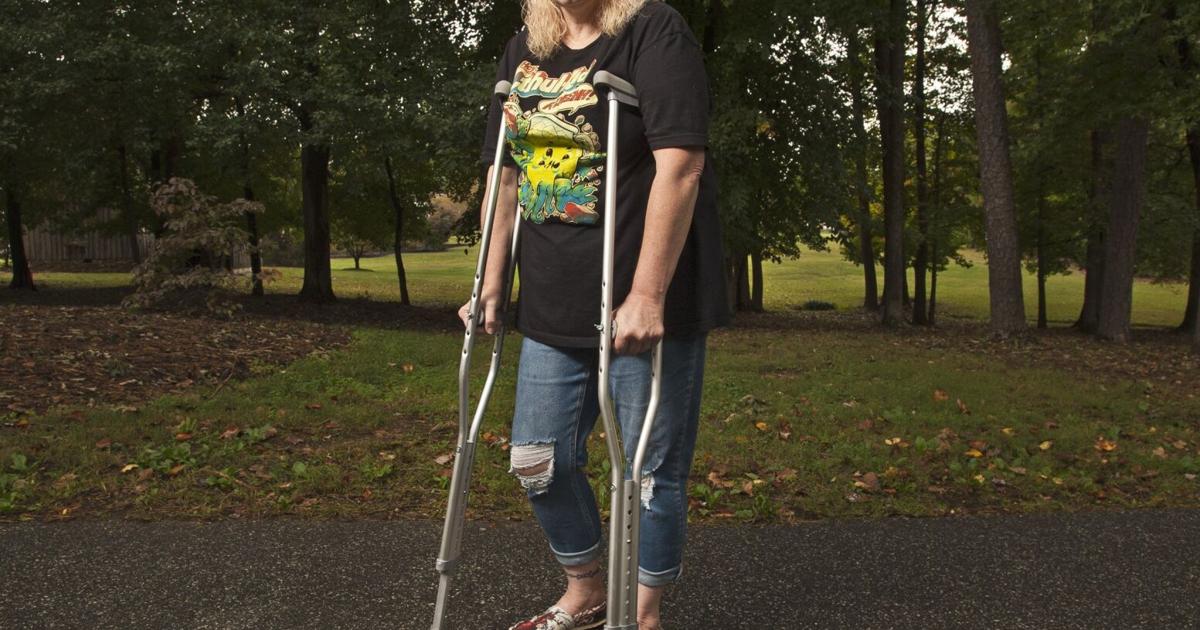
Contracting COVID-19 has sent Alicia Pender’s life into a physical and emotional tailspin since her diagnosis in December 2020.
But what is causing Pender the most stress, she said, is being overwhelmed by more than $30,000 in COVID-19 related medical bills.
About $14,000 already has been forward by Atrium Health Wake Forest Baptist to debt collections and another $16,000 — and mounting — is in the process. Pender provided copies of her medical bills to the Journal.
“Being sick has caused me to almost lose everything I have worked my life for,” Pender said.
Pender, 49, a Kernersville resident and mother of two daughters and a son, was employed as a travel registered nurse at several Triad healthcare facilities until contracting COVID-19 she believes from either a co-worker or a patient.
People are also reading…
“I just feel like I just exist right now,” Pender said. “I’m very ashamed and humiliated to be in this position because I have a college education.”
Pender said she has been able to maintain private health insurance with Blue Cross Blue Shield of N.C., with the premiums being paid by her oldest daughter, Devon.
Devon also has created a GoFundMe.com account — https://www.gofundme.com/f/single-mom-going-through-crisis-after-crisis?utm_source=facebook&utm_medium=social&utm_campaign=p_cf+share-flow-1&fbclid=IwAR0rh4Gwh_YIAxBYkO4IlOMUUfVBymk1v0iqd2IC-n5SXxf-2-svzpd3Hgo — for her mother to ask for assistance in paying for her mother’s expenses.
The Penders are asking for $20,000 in GoFundMe assistance for rent, food and monthly bills.
Blue Cross has paid thousands of dollars of Pender’s medical bills once she met her individual $3,800 in-network deductible, but her family has not met their $7,800 in-network deductible. Pender’s out-of-network deductible is $19,000.
Even with co-insurance, Pender’s share of her medical bills is 40%.
Yet, she finds herself with at least $30,000 in medical debt even after meeting her annual high deductible requirement.
She said she’s been told by Baptist officials that because she has private insurance, she’s not eligible for charity care or other assistance through the health-care system.
Instead, they recommend she reach out to nonprofit and charitable groups to help pay her medical bills.
“I’m really frustrated because they advertise the resources, but when you call or go online to check into the resources, they are either not real or you are not eligible,” Pender said.
“I can’t figure out how to get out of this hellhole, this quicksand. It’s a vicious cycle that having poor physical health has led me to having poor mental health.
“It just feels like everything is adding up, and the more it adds up, the more the frustration and depression mounts up and there’s no end in sight,” she said.
Health issues
At the top of Pender’s list of serious ailments is heart issues caused by COVID-19 that has led her to undergo three cardiac ablation procedures.
Those procedures are designed to cause scar tissue in the heart in order to block irregular electrical signals. It is used to treat heart rhythm problems, such as arrhythmias.
A heart pump has been placed in her chest.
She occasionally experiences the COVID “brain fog” that also affects her balance, Her asthma has become more virulent. She underwent a total hysterectomy “because I couldn’t afford the $2,000 a month for medication for my lady parts.”
Part of her treatment for depression and anxiety has been electroconvulsive therapy, in which small electric currents are passed through the brain, intentionally triggering a brief seizure. According to The Mayo Clinic, the therapy “seems to cause changes in brain chemistry that can quickly reverse symptoms of certain mental health conditions.”
Unrelated to having COVID-19, she recently had surgery on her right knee that was injured when she was assisting her bed-bound father, as well as surgery on a chronic ailment involving her right clavicle.
She’s also having a biopsy done soon on a lump in her chest to determine whether it is breast cancer.
A fairly normal life
Before being infected with COVID-19, Pender said her family led a “fairly normal life” including going on vacation, make home improvements.
“I won’t say I was so happy that I was doing cartwheels because all adults and some children have some level of stress,” she said.
“Now, I don’t know what’s going to happen day to day, and whether I can afford my 13 medications for the long COVID at the same time if I can get them.”
Pender said she was aware of the risk of contracting COVID-19 as a travel nurse, particularly before a vaccine became available.
“I like to think I was doing my duty by being a frontline health-care worker during COVID, and I stuck it out even after being exposed because I was told I couldn’t stay out,” Pender said.
“But when COVID arrived, it hit me like a ton of bricks.”
Pender’s youngest daughter, Bianca, also contracted COVID-19 and is dealing with her own long COVID symptoms that include heart issues.
Waking up every day with the medical debt pressing on her psyche “doesn’t make me a good nurse, good mother, a good daughter, a good friend because I have to be focused on me, me, me,” she said.
Pender said her experiences with debt collectors shows that “all they want is the money, most of them rude.”
She said one debt collector representative seemed to empathize with her situation, saying she would put the collection efforts on hold.
“Yet, they are still calling me, so it doesn’t really seem to matter what I say or what I tell them because everybody has a sob story they tell them,” Pender said.
“They are going to keep blowing up my phone, and I’m going to keep not answering it.”
Source link
